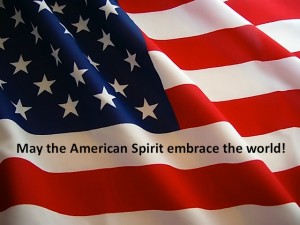How did our country get its name?
The word “America” is derived from the name of an Italian merchant and traveler, Amerigo Vespucci of Florence (1454-1512). The Latinized form of his name is Americus Vespucius. He was skilled in astronomy and navigation, and explored the New World at the end of the 15th century and in the early 16th century.
Christopher Columbus is credited with discovering the New World in 1492 in the name of the King of Spain. (Previously he had approached King Henry VII of England for financial aid in undertaking a westward voyage in search of India, but Henry turned him down.) Columbus made three other westward voyages—in 1495, 1498 and 1502. Convinced he had had sailed to Asia and found a new way to the old world, he called the islands the Indies.
After Columbus’s initial success, France, England and Portugal realized its importance and quickly joined in the exploration, competing for territory and resources. In 1497 Henry commissioned John Cabot, who sailed to Labrador or Cape Breton—the exact site is uncertain—and claimed what is now the east coast of the United States in the name of the king of England. The first French explorers in the New World are unknown, but by 1504 Cape Breton had been named; it is the oldest French place- name in North America.
In 1497, Vespucci went as one of the pilots on a voyage to the northern coast of South America; the expedition was authorized by the King of Spain. In 1501, Vespucci sailed from Lisbon in a Portuguese fleet of three ships to Brazil and skirted the coast as far south as the La Plata River. He made a third expedition to the southern continent and in 1504 wrote letters giving an account of what he had seen in the novus mundus, the “new world,” as he called it to distinguish it from the Old World. He declared that he had found a continent in the south “more populous and full of animals than our Europe or Asia or Africa and even more temperate and pleasant than any other region known to us.”
Vespucci’s account found its way into print in 1504 at Augsburg, Germany. It was the first published narrative of any discovery of the mainland.
The account went through many editions; the 1505 edition, published in Strassburg, mentioned Vespucci on its title page as having discovered a new “Southern Land.” This is the first instance hinting at the continental nature of the new discovery, as separate from Asia.
Vespucci’s voyages were of great importance because they proved the existence of a new continent. They showed that South America was not part of the Indies discovered by Columbus, who had insisted he had found a new way to the old world. He therefore failed to realize the true situation. Previously, some geographers had suspected there was a great southern continent; they called it the “Fourth Part,” with Europe, Asia and Africa being the three known parts of the world. Vespucci’s voyages confirmed the existence of this Fourth Part; they also secured Brazil for the Portuguese crown and resulted in giving the name “America” to the Western Hemisphere.
